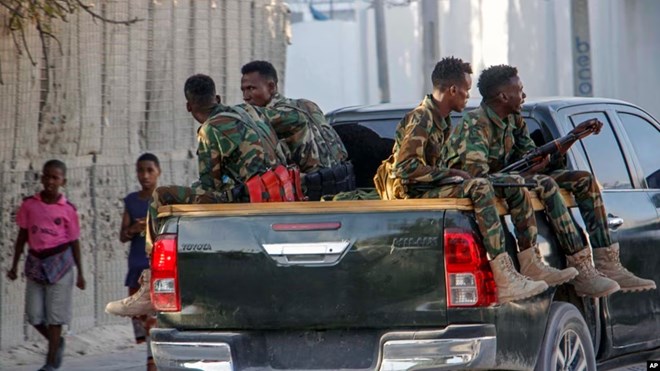
Friday December 20, 2024
By Harun Maruf and Kennedy Abate

FILE - Somalia police patrol near the scene of a suicide bomber attack at a cafe, in Mogadishu, Somalia, Oct. 17, 2024. Somali leaders are “ready to reconsider” Ethiopian military support in the country after talks held in Turkey on Dec. 11, 2024.
The Somali government is “open” to a potential role for Ethiopian troops in an African Union mission scheduled to take over peacekeeping operations in the country next month.
A senior Somali government official on Thursday told VOA’s Horn of Africa Service that the Somali government has “secured” and “allocated” all troops needed from the four other AU-troop-contributing countries — Burundi, Djibouti, Kenya and Uganda — to participate in the African Union Support and Stabilization Mission in Somalia, or AUSSOM. He spoke on condition of anonymity because he had not been cleared to speak with reporters.
In recent months, Mogadishu had repeatedly demanded that Addis Ababa withdraw its troops from Somali territory unless Ethiopia canceled a controversial Memorandum of Understanding with Somalia’s breakaway region of Somaliland. The memorandum grants Ethiopia access to a 20-kilometer stretch of Red Sea coastline in return for potential recognition of Somaliland’s independence.
The anonymous official said although Somalia secured all troops from those four AU nations to compensate for the absence of Ethiopian troops, the recent diplomatic breakthrough has reopened the door for involving Ethiopia’s military support.
During the talks in Ankara, Ethiopia and Somalia agreed to respect each other’s sovereignty, unity and territorial integrity.
The possible breakthrough came just weeks after a spokesperson for Ethiopian Ministry of Foreign Affairs, Nebiat Getachew, told media outlets that Ethiopia’s focus was on al-Shabab.
"Ethiopia's key role, in any situation — in bringing al-Shabab to a level where it cannot be a threat to the region, as well as its role in the establishment and stability of the Somali government — is known both by the Somalis and the international community,” he said.
“It is an undeniable fact that the Ethiopian army has made sacrifices in blood and bones for this great result,” Nebiat added. “The work of weakening the [Somalia-based] al-Shabab terrorist group will continue under any circumstances so that it does not pose a threat to our national security and the victories achieved through the sacrifices made so far are not reversed.”
In a Thursday meeting, the AU’s peace and security council expressed concern about the threat posed by al-Shabab and condemned the group’s attacks on Somali and AU forces.
The AU appealed to the U.N. Security Council to explore financing options for AUSSOM.
“This is vital for #AUSSOM to fulfill its mandate & support the #Somalia Security Sector Development Plan (SSDP),” the AU said in a post on the X social media platform.
Starting in January, AUSSOM will have 11,900 personnel operating on the ground in Somalia, including soldiers, police and civilian support staff, according to Somali and AU officials.